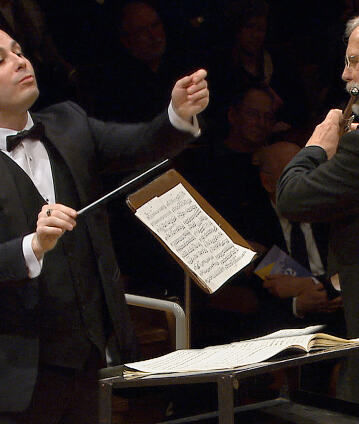Yannick Nézet-Séguin conducts Mahler and Reinicke

In this concert from March 2014, and in the farewell season of his 45-year-career as principal flautist with the Berliner Philharmoniker, Andreas Blau gives a sparkling performance of Carl Reinecke’s lyrically Romantic Flute Concerto in D major, a work which the orchestra plays here for the very first time. Under the baton of the young Canadian conductor Yannick Nézet-Séguin, the programme also includes Gustav Mahler’s graceful Fourth Symphony.
The name Carl Reinecke rarely appears on concert programmes. Born in Hamburg in 1824, the composer was best known at the time for his Sonata Undine. Reinecke was well connected with important European figures – he was court pianist in Denmark, was invited to Paris by Hector Berlioz, took over the direction of the Gewandhaus concerts in Leipzig in 1859, and later became director of the conservatory there. He said of his greatest role models Felix Mendelssohn and Robert Schumann: “I would not object to being called an imitator.” His Romantic flute concerto is one of the standard works in the repertoire today.
In this concert from March 2014, and in the farewell season of his 45-year-career as principal flautist with the Berliner Philharmoniker, Andreas Blau gives a sparkling performance of Carl Reinecke’s lyrically Romantic Flute Concerto in D major, a work which the orchestra plays here for the very first time. Under the baton of the young Canadian conductor Yannick Nézet-Séguin, the programme also includes Gustav Mahler’s graceful Fourth Symphony.
Compared to the monumental dimensions of the Second and Third Symphonies, the work appears to be significantly scaled back in scope and instrumentation. After its two predecessors, the Fourth seems almost like a detoxification. It lasts just over one hour and is relatively frugally orchestrated; performance markings like “rather leisurely” or “very comfortable” warn interpreters not to generate excess pressure. And then the Finale – not a monumental climax, but a song of downright suggestive simplicity that recounts the “joys of heavenly life”. However, appearances can be deceptive: like Mahler’s other symphonies, the Fourth is also ambiguous. Moods change suddenly in a hardly noticeable way; expectations are dashed and abysses gape abruptly in the seemingly naive idyll.
© 2014 Berlin Phil Media GmbH
Related interview
Artists
Our recommendations
- Christian Thielemann conducts a concert “à la française”
- 2020 Europakonzert from the Philharmonie Berlin with Kirill Petrenko
- Emmanuelle Haïm conducts Handel’s “La resurrezione”
- Iván Fischer and Christiane Karg
- Yannick Nézet-Séguin and Beatrice Rana
- Yannick Nézet-Séguin makes his debut with Berlioz and Prokofiev